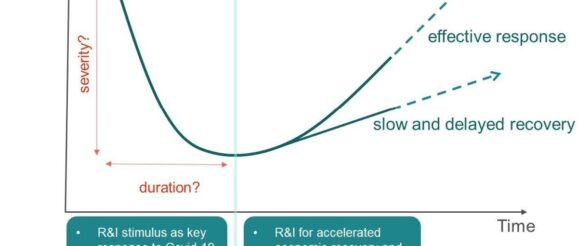Research and innovation and the COVID-19 pandemic – SetThings

The COVID-19 crisis is unprecedented. It has disrupted our lives, economy and society and the world has been struggling to contain the pandemic. While research and innovation (R&I) are at the core of the response to the pandemic itself in the areas of virology, vaccines development, treatments and diagnostics, it will be crucial also in the economic recovery from the crisis, not only to spur economic activity, but also to accelerate the transitions that our planet and society need – a new economy for health, wellbeing and equality in a broad sense (physical, mental, skills, gender, social, environmental and economic aspects). R&I can also help build system-wide resilience. Technologies already help alleviate, at least partially, the severity of the economic shock, with digital technologies being at the core of business continuity in several sectors. Overall, the role of R&I can be considered in the short-term context of the sanitary crisis and economic contraction, but also in the longer term and aftermath of the crisis, as a key driver of the recovery. It is of paramount importance to invest in making our society and economy stronger, more resilient, sustainable and capable of a rapid and integrated response drawing on the latest scientific discoveries, ensuring equal access to healthcare, education and ICT across the EU, and social and economic support to its most vulnerable populations.
The unique nature of the COVID-19 crisis has led to war analogies, due to similarities in having the population dealing simultaneously with death tolls, lockdown and economic recession, but these are to be considered cautiously. Compared to previous sanitary crises such as SARS or Ebola, it has also generated higher levels of economic uncertainty. It is also tempting to make an analogy between the current crisis and the global financial crisis from a decade ago, also due to similarities in terms of uncertainties, economic collapse and massive support from monetary and fiscal policies to limit the shock.
 (R&I and the economic recovery from the COVID-19 crisis)
(R&I and the economic recovery from the COVID-19 crisis)
While the assumption of a significant economic contraction in 2020 caused by COVID-19 is indeed supported by the latest economic forecasts, there are still uncertainties about the severity of the impact as it will also depend on policy actions, the evolution of the pandemics and the development of vaccines in the next months. IMF estimates suggest that we are living the worst recession since the Great Depression (global economic growth is estimated at -4.9% in 2020 and the cumulative loss over 2020 and 2021 may amount up to 9 trillion dollars). According to the
Summer 2020 Economic Forecast of the European Commission, the EU economy is forecast to contract by 8.3% in 2020, with a rebound growth by 5.8% in 2021. Applied to R&D, assuming constant R&D intensity, that would translate into a drop of EUR 25 billion. The shock to the EU economy is symmetric in that the pandemic has hit all Member States, but both the drop in output in 2020 and the strength of the rebound in 2021 are set to differ markedly across sectors, regions and countries. Regarding jobs, the impact is also expected to differ according to regional and sectoral variations, with teleworkability being a key factor in alleviating the negative impact of the crisis.
© European Union, 2020
